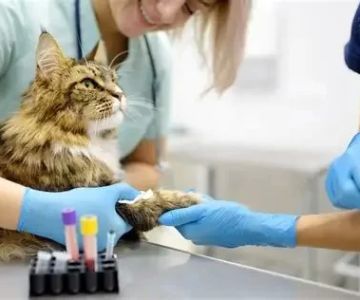- 1-Understanding-Chronic-Illness-in-Pets
- 2-Developing-a-Care-Plan-for-Your-Pet
- 3-Monitoring-Symptoms-and-Managing-Medications
- 4-Nutrition-and-Lifestyle-Adjustments
- 5-Emotional-Support-for-Pets-and-Owners
- 6-Real-Life-Experiences-from-Pet-Owners
- 7-Partnering-with-Veterinarians-and-Specialists
1. Understanding Chronic Illness in Pets
Caring for a pet with a chronic illness requires a solid understanding of what chronic conditions are and how they affect your pet’s life. Chronic illnesses in pets, such as diabetes, arthritis, kidney disease, or heart conditions, develop slowly and require ongoing management rather than a quick cure.
Unlike acute illnesses that resolve with treatment, chronic diseases often fluctuate in severity and demand continuous attention. Recognizing early signs and understanding your pet’s specific condition are essential first steps in effective care. For example, a dog with chronic arthritis may experience stiffness and mobility challenges that gradually worsen over time.
Being informed about the nature of chronic illness helps owners adjust expectations and prepare for long-term care commitments, fostering a supportive environment that improves quality of life for their pets.
1.1 The Impact of Chronic Illness on Daily Life
Chronic illness can alter a pet’s behavior, appetite, and energy levels. Some pets may require frequent vet visits, specialized diets, or medications, while others benefit from environmental adjustments like ramps or orthopedic beds.

7815 Sunnyside Rd, Indianapolis, IN 46236, USA
See Details2. Developing a Care Plan for Your Pet
Every pet with a chronic illness needs a tailored care plan designed in partnership with a veterinarian. This plan typically includes regular health monitoring, medication schedules, dietary guidelines, and exercise recommendations.
Creating a detailed schedule helps ensure consistency, which is vital for managing chronic conditions. For instance, a cat with kidney disease might require daily fluid therapy and a specialized renal diet to slow disease progression.
Care plans also involve setting realistic goals—improving comfort and maintaining function rather than expecting a cure. This mindset allows owners to celebrate small victories and adjust care as needed.
2.1 Importance of Communication and Record-Keeping
Maintaining clear communication with your veterinary team and keeping detailed records of symptoms, medications, and behavioral changes helps identify patterns and adjust treatments effectively.
3. Monitoring Symptoms and Managing Medications
One of the most critical aspects of caring for a pet with a chronic illness is vigilant symptom monitoring. Early detection of flare-ups or side effects can prevent complications and hospitalizations.
Administering medications on time and understanding their purposes and potential side effects are equally important. Many chronic conditions require complex medication regimens that may seem overwhelming at first but become manageable with practice and support.
For example, pets with diabetes often need insulin injections and regular blood sugar testing. Learning how to perform these tasks safely at home empowers owners and improves pet outcomes.
3.1 Tools and Technologies to Support Medication Management
Digital reminders, pill organizers, and veterinary apps can assist pet owners in staying on top of medication schedules and veterinary appointments.
4. Nutrition and Lifestyle Adjustments
Diet plays a pivotal role in managing chronic illnesses in pets. Many veterinary diets are formulated to support specific conditions, such as low-protein diets for kidney disease or joint-support formulas for arthritis.
Alongside proper nutrition, lifestyle adjustments like controlled exercise and weight management improve overall wellbeing and reduce disease impact. For instance, moderate walks help maintain muscle strength in dogs with arthritis without causing undue stress on joints.
Environmental enrichment, including comfortable resting areas and mental stimulation, also contributes to a pet’s quality of life.
4.1 Consulting Nutrition Experts
Working with veterinary nutritionists can help customize feeding plans tailored to your pet’s unique needs and preferences.
5. Emotional Support for Pets and Owners
Living with a chronically ill pet can be emotionally taxing. Pets may experience anxiety or discomfort related to their illness, while owners can face stress, uncertainty, and fatigue.
Providing gentle affection, maintaining routines, and engaging in activities your pet enjoys strengthens emotional bonds and eases discomfort. Pet owners benefit from support groups, counseling, and educational resources to navigate the emotional challenges.
Recognizing the emotional dimension of chronic illness care fosters resilience and empathy on both sides.
6. Real-Life Experiences from Pet Owners
Jessica, a longtime dog owner, shares her journey with Max, a Labrador diagnosed with chronic kidney disease. “At first, it was overwhelming, but working closely with our vet and adjusting Max’s diet and medications made a huge difference. Max still enjoys his daily walks and playtime, and knowing how to care for him keeps me confident.”
Stories like Jessica’s inspire other pet owners by showing that chronic illness management is possible with the right knowledge and support.
7. Partnering with Veterinarians and Specialists
Effective chronic illness care depends heavily on a strong partnership with your veterinary team. Regular check-ups, diagnostic testing, and specialist consultations help track your pet’s condition and refine care plans.
Hidden Brook Veterinary offers expert services tailored for pets with chronic illnesses, providing comprehensive care, personalized treatment plans, and access to advanced diagnostics and therapies. Trusting professionals allows you to focus on giving your pet comfort and love every day.









